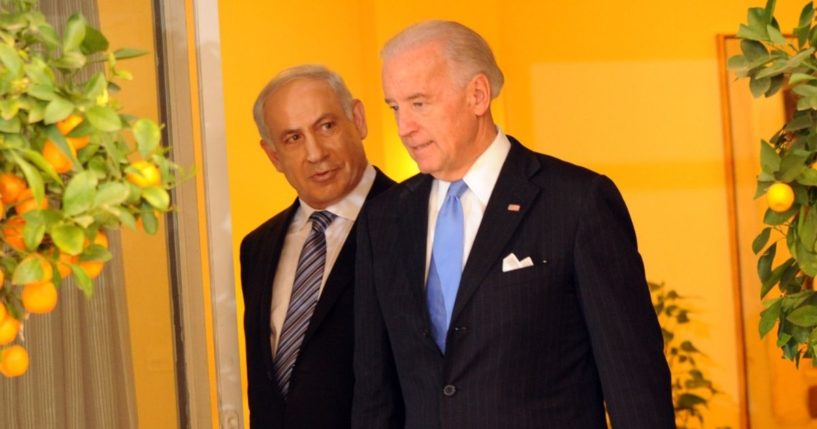
Netanyahu Sends Israel a Serious Warning About the Biden Administration
Former Israeli Prime Minister Benjamin Netanyahu slammed Israel’s current government Monday for allegedly agreeing to a “no surprises” policy whereby Israel will keep the Biden administration informed of any actions it undertakes against Iran.
“The information that is sent to America could be leaked to major media outlets and in this way our operations will be thwarted,” Netanyahu, who is now the opposition leader in the Knesset — the Israeli single-chamber equivalent of Congress — said when the legislature was in session.
“That is why for the last decade I have refused the requests of American presidents to always inform them of our actions.”
Netanyahu’s remarks were reported by The Times of Israel and on Twitter by Tel-Aviv-based Axios contributor Barak Ravid.
BREAKING: Netanyahu says the Biden administration could leak information about planned Israeli operations against Iran to the international media in order to prevent it and therefore Israel shouldn’t agree to a “no surprises” policy regarding Iran with the U.S.
— Barak Ravid (@BarakRavid) August 2, 2021
Media in Israel is regulated by the Israeli Military Censor, an Israeli Defense Forces Directorate of Military Intelligence division responsible for controlling the publication of military-related information in the country.
The Censor ensures that information sensitive to Israel’s security interests doesn’t come out through reporting from Israeli outlets.
However, the United States lacks such a censor during times of peace.
This enables sensitive information shared by Israel with the U.S. government to leak out through insiders who share information with reporters at major American news outlets.
These outlets can then release the information through articles citing unnamed sources, possibly jeopardizing any confidential military or diplomatic action Israel was contemplating.
The “no surprises” policy, Netanyahu said, “is an existential issue for Israel, in which there may be surprises and sometimes surprises are needed,” the Times reported.
One Israeli official told Ravid that Netanyahu’s statement was an attempt by the former prime minister “to sabotage Israel-U.S. relations for his political interests,” the journalist wrote on Twitter.
Israeli official tells me Netanyahu is trying to sabotage Israel-U.S. relations for his political interests https://t.co/sw9EKlZ6T1
— Barak Ravid (@BarakRavid) August 2, 2021
According to a 2014 report from Ravid in the Israeli outlet Haaretz, an unnamed Israeli official told the outlet that Israel and the United States maintained a “no surprises” understanding when the Iran deal was being negotiated.
The objective of the policy, according to the report, was to ensure that Washington was in the loop about Israel’s plans for dealing with the threat of Iranian nuclear weapons and that Washington informed Jerusalem in advance about the United States’ communications with Iran.
As of 2021, the policy is still in place, reporting from the Times suggests.
Then-Israeli Foreign Minister Gabi Ashkenazi reportedly agreed earlier this year to a “no surprises” policy with the Biden administration, while Netanyahu still held the reins of the Israeli government, according to the Times.
White House National Security Advisor Jake Sullivan told NBC News in an April interview that despite disagreements between Israel and the Biden administration over the U.S. re-entering a nuclear deal with Iran or negotiating another deal altogether, the two sides maintain a policy of “no surprises.”
“We believe, profoundly and passionately, in making sure that we and Israel have a policy of no surprises,” Sullivan told the outlet.
“We are communicating with one another on a going-forward basis, so that we have a better understanding … on what the other side intends to do with respect to a whole range of security issues in the region,” he said.
Sullivan mentioned in the interview that the Biden administration prefers that Israel does not engage in “certain kinds of activities” that are supposedly unhelpful to “diplomacy.”
The Iran nuclear deal became a contentious issue between Israel and the U.S. when Netanyahu was prime minister and former President Barack Obama was in power with then-Vice President Joe Biden as his number two.
Obama’s willingness to go ahead with the deal, despite Israel’s objections, caused tensions between the two allies until former President Donald Trump took over and repaired ties with Israel.
Trump also withdrew the U.S. from the nuclear deal, citing its ineffectiveness at keeping nuclear arms away from Iran, and reimposed harsh sanctions against Tehran, aimed at preventing Iran’s theocratic government from obtaining the revenue necessary to pursue its nuclear program.
However, with Biden in the White House, the U.S. has backtracked from the posture Trump had, and is now seeking to negotiate with Tehran, whose commitment and adherence to a potential renegotiated nuclear deal remains in question.
Truth and Accuracy
We are committed to truth and accuracy in all of our journalism. Read our editorial standards.
Advertise with The Western Journal and reach millions of highly engaged readers, while supporting our work. Advertise Today.












